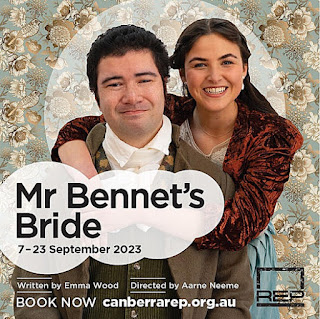Mr. Bennet’s Bride by Emma Wood.
Directed by Aarne Neeme AM. Canberra Repertory Theatre. September 7-23. Bookings: 62751950
Reviewed by Peter Wilkins

Playwright of Mr. Bennet's Bride Emma Wood
There is a great sense of fun
pervading Canberra Rep’s latest production of Emma Wood’s prequel to Pride and Prejudice, Mr. Bennet’s Bride. It is obvious that
playwright Wood has thoroughly immersed herself in Jane Austen’s work and
relished imbuing her dialogue and characters with Jane Austen’s perspicacious dialogue and early nineteenth
century characters, manners and customs. The actors embrace the silliness and
small village nature of Austen’s society with enthusiasm. Director Aarne Neeme
deftly introduces moments of awkward silence and comical business and reactions
to heighten the hilarity of Mr. Bennet Senior’s frustration, James Bennet’s sullen responses, Sarah Gardiner’s skittishness
and Emily Gardiner’s silly giggling. And judging by an almost full house the
audience found it all rollicking good fun as their laughter echoed through the
auditorium.
The plot is simple enough. As the
lights come up on another carefully
designed set by Andrew Kay, we discover James (Sean Sadimoen) sleeping behind
the settee in view of the audience but
not his irate father (Rob De Fries) or his flustered aunt (Liz St Clair Long)
and their maid (Sally Rynveld.) Mr Bennet and
his sister Mary Ellingworth are awaiting the arrival of Mrs Bowman (Rita
Onorato) and her daughter Clara (Cameron Rose) to introduce Clara to James in
the hope of creating a romantic attachment that will lead to marriage and an
heir to the Bennet fortune and high standing in the cloistered society. Wood carefully charts the expected course of
Regency manners and Mr Bennet’s expectations
There are manners to observe and
obstacles to overcome such as the birth of a son to ousin Benedict Collins
(Terry Johnson) and James’s rebellious reaction to his father’s stern will. But
in the end wits and wile win out and James finds his giggling Emily (Stephanie
Waldron) whose attorney father (Iain Murray) and equally giggling mother (Kate Harris)
wheedle their way into Mr. Bennet’s plan to find his son a wife. Wood has paid allegiance to Jane Austen’s subtly rebellious
nature as she probes into motives and superficiality and exposes artifice and
covert purpose.
Austen fans are sure to enjoy Mr Bennet’s Bride and those unfamiliar
with Pride and Prejudice may enjoy
the production on a more superficial level. The nuance is less evident in the
straight playing and interpretation. Motive is clear in Wood’s dialogue but the
intent behind the artifice and social custom appears less obvious in the
playing. Perhaps I would have appreciated a clearer insight into the pressures
that determined the behaviour of those
characters as they faced parental dictate, class expectation and advancement
opportunity. But whether one probes the complexity of human nature or the
subtle satire that Wood has gleaned from the original inspiration, audiences
are certain to enjoy a night’s entertainment and Wood’s plausible prequel to
Jane Austen’s sparkling and gently
critical insight.
